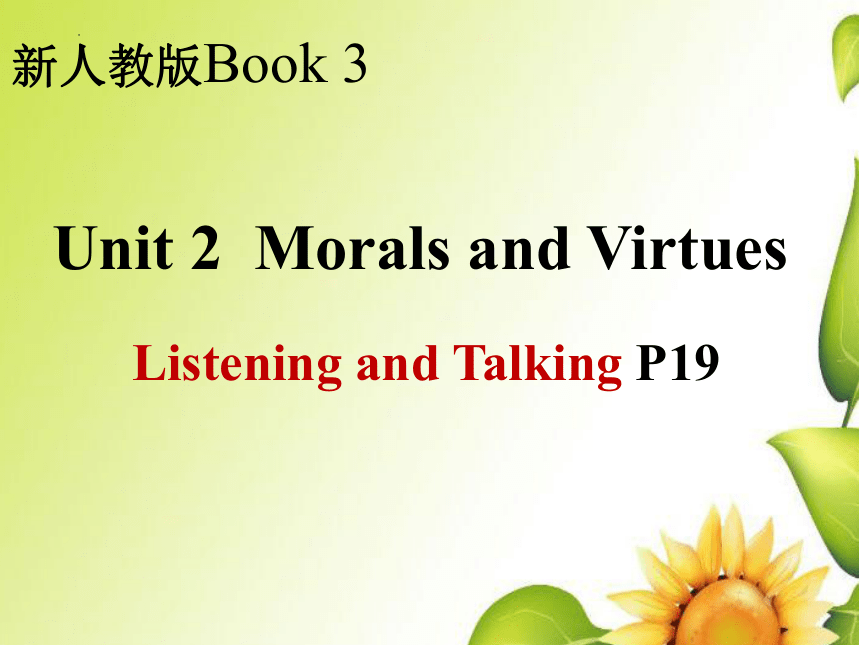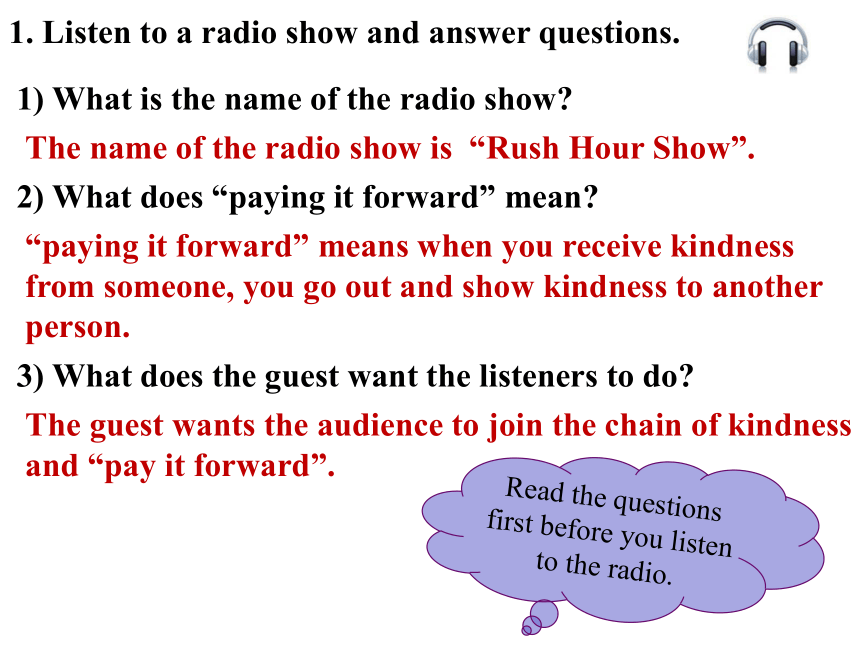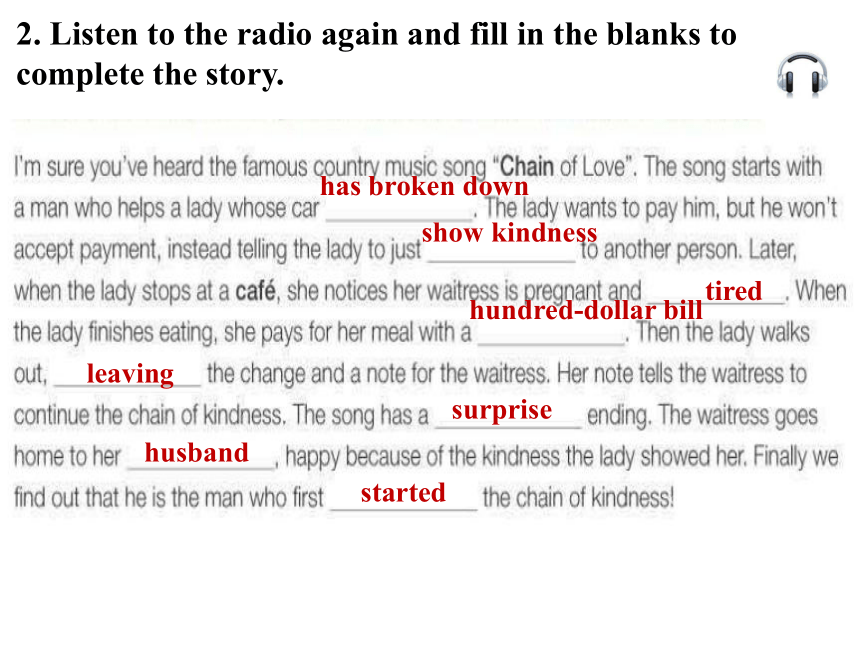高中英语人教版(2019)必修第三册Unit2Morals and Virtue Listening and TalkingP19课件(11张ppt)
文档属性
| 名称 | 高中英语人教版(2019)必修第三册Unit2Morals and Virtue Listening and TalkingP19课件(11张ppt) |

|
|
| 格式 | zip | ||
| 文件大小 | 7.6MB | ||
| 资源类型 | 教案 | ||
| 版本资源 | 人教版(2019) | ||
| 科目 | 英语 | ||
| 更新时间 | 2022-06-23 00:00:00 | ||
图片预览





文档简介
(共11张PPT)
Listening and Talking P19
新人教版Book 3
Unit 2 Morals and Virtues
Let's learn a song about “kindness”.
1. Listen to a radio show and answer questions.
1) What is the name of the radio show
2) What does “paying it forward” mean
3) What does the guest want the listeners to do
The name of the radio show is “Rush Hour Show”.
“paying it forward” means when you receive kindness from someone, you go out and show kindness to another person.
The guest wants the audience to join the chain of kindness and “pay it forward”.
Read the questions first before you listen to the radio.
2. Listen to the radio again and fill in the blanks to
complete the story.
has broken down
show kindness
tired
hundred-dollar bill
leaving
surprise
husband
started
听力原文
Host: Hello and welcome to the Rush Hour Show, the radio show for your way home. Our guest today is Kevin Miller, with the Pay It Forward Foundation. Welcome, Kevin, so what is “paying it forward”
Kevin: Hi, there. So “paying it forward”means that if you receive kindness from someone, you don't try to pay them back. Instead, you go out and show kindness to someone else.
Host: Oh, so it's like helping a stranger. Can you give us an example of how it works
Kevin: Well, I'm sure you've heard the famous country song, “The Chain of Love”. The song starts with a man who helps a lady whose car has broken down. The lady wants to pay him, but he won't accept payment, instead telling the woman to just show kindness to another person. Later, when the lady ...
Continued on next page
听力原文
stops at a cafe, she notices her waitress is pregnant and tired. When the lady finishes eating, she pays for her meal with a hundred-dollar bill. Then the lady walks out, leaving the change and a note for the waitress. Her note tells the waitress to continue the chain of kindness. The song has a surprise ending. The waitress goes home to her husband, happy because of the kindness the lady showed her. Then we find out that he's the man who first started the chain of kindness!
Host: What a great story! So does this happen in real life
Kevin: Yes, actually. One woman, after paying for her coffee, then quietly paid for the coffee of the customer behind her. When that customer discovered his coffee had been paid for, he paid for the customer behind him.
Continued on next page
听力原文
The chain of kindness continued for hours. Nearly 400 people paid for the coffee of the person behind them!
Host: Wow, that's amazing. So what can our listeners do to help
Kevin: Well, join the chain of kindness today and join the millions of people who are “paying it forward”! We never know what light we might spark in others by ous kindness.
More practice...
3. Think of a story of showing or receiving kindness, either
your own story or one that you have heard of. Here are some words and expressions that may help you.
once upon a time / long ago /first of all
then / after that / later / finally / so
however / although / but
I remember this happened when I was ...
I was on my way to ...
I was sitting ... when ...
It was a ... day/morning ...
There were ... on the street ...
Sample Writing
Once, I did not have money to go to university, and someone paid my tuition that term. This happened when I was eighteen. My grandmother had just died, and this had caused my family great expense, so we had no extra money at all. I did everything I could to raise the money, but it seemed hopeless. Then the morning that the tuition was due, someone gave my mother an envelope with the money. It wasn't their money, and they wouldn't say who it was from. It seems that some stranger had heard about my money problem and decided to help. This meant so much to me, as without it I would not have been able to go to university.
Tell a story
Tips:
When tell a story, you can start by saying what the story is about. Give the background to the listeners, including when and where it took place. Say what happened step by step and be sure to use correct tenses. Do not forget to use sequencing words or linking words. Finally, finish your story by saying why it is important to you or why you remember it.
Thank you!
Listening and Talking P19
新人教版Book 3
Unit 2 Morals and Virtues
Let's learn a song about “kindness”.
1. Listen to a radio show and answer questions.
1) What is the name of the radio show
2) What does “paying it forward” mean
3) What does the guest want the listeners to do
The name of the radio show is “Rush Hour Show”.
“paying it forward” means when you receive kindness from someone, you go out and show kindness to another person.
The guest wants the audience to join the chain of kindness and “pay it forward”.
Read the questions first before you listen to the radio.
2. Listen to the radio again and fill in the blanks to
complete the story.
has broken down
show kindness
tired
hundred-dollar bill
leaving
surprise
husband
started
听力原文
Host: Hello and welcome to the Rush Hour Show, the radio show for your way home. Our guest today is Kevin Miller, with the Pay It Forward Foundation. Welcome, Kevin, so what is “paying it forward”
Kevin: Hi, there. So “paying it forward”means that if you receive kindness from someone, you don't try to pay them back. Instead, you go out and show kindness to someone else.
Host: Oh, so it's like helping a stranger. Can you give us an example of how it works
Kevin: Well, I'm sure you've heard the famous country song, “The Chain of Love”. The song starts with a man who helps a lady whose car has broken down. The lady wants to pay him, but he won't accept payment, instead telling the woman to just show kindness to another person. Later, when the lady ...
Continued on next page
听力原文
stops at a cafe, she notices her waitress is pregnant and tired. When the lady finishes eating, she pays for her meal with a hundred-dollar bill. Then the lady walks out, leaving the change and a note for the waitress. Her note tells the waitress to continue the chain of kindness. The song has a surprise ending. The waitress goes home to her husband, happy because of the kindness the lady showed her. Then we find out that he's the man who first started the chain of kindness!
Host: What a great story! So does this happen in real life
Kevin: Yes, actually. One woman, after paying for her coffee, then quietly paid for the coffee of the customer behind her. When that customer discovered his coffee had been paid for, he paid for the customer behind him.
Continued on next page
听力原文
The chain of kindness continued for hours. Nearly 400 people paid for the coffee of the person behind them!
Host: Wow, that's amazing. So what can our listeners do to help
Kevin: Well, join the chain of kindness today and join the millions of people who are “paying it forward”! We never know what light we might spark in others by ous kindness.
More practice...
3. Think of a story of showing or receiving kindness, either
your own story or one that you have heard of. Here are some words and expressions that may help you.
once upon a time / long ago /first of all
then / after that / later / finally / so
however / although / but
I remember this happened when I was ...
I was on my way to ...
I was sitting ... when ...
It was a ... day/morning ...
There were ... on the street ...
Sample Writing
Once, I did not have money to go to university, and someone paid my tuition that term. This happened when I was eighteen. My grandmother had just died, and this had caused my family great expense, so we had no extra money at all. I did everything I could to raise the money, but it seemed hopeless. Then the morning that the tuition was due, someone gave my mother an envelope with the money. It wasn't their money, and they wouldn't say who it was from. It seems that some stranger had heard about my money problem and decided to help. This meant so much to me, as without it I would not have been able to go to university.
Tell a story
Tips:
When tell a story, you can start by saying what the story is about. Give the background to the listeners, including when and where it took place. Say what happened step by step and be sure to use correct tenses. Do not forget to use sequencing words or linking words. Finally, finish your story by saying why it is important to you or why you remember it.
Thank you!
